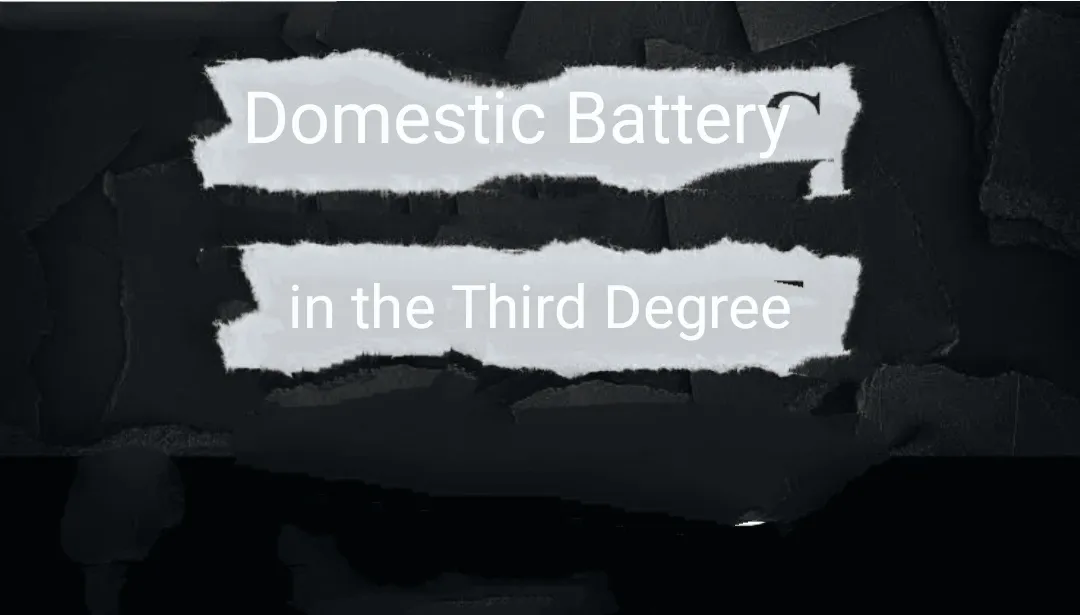Domestic Battery in the Third Degree: A Comprehensive Overview
Domestic Battery 3rd Degree: Legal Consequences and Defense Strategies

Introduction
Domestic violence is a serious issue worldwide, affecting individuals and families across all socioeconomic and cultural boundaries. Among the various charges that can be brought in a domestic violence case, one of the most common is a domestic battery in the third degree. This charge typically involves physical harm or the threat of bodily harm against a household member, but it is considered less severe than first and second-degree battery charges.
Understanding the nuances of domestic battery in the third degree is crucial, not only for those involved in these cases but for society at large. In this comprehensive blog post, we will explore what domestic battery in the third degree entails, its legal implications, possible defenses, and the broader impact of domestic violence on families and society.
1. What is Domestic Battery in the Third Degree?
Table of Contents
Legal Definitions and Criteria
Domestic battery in the third degree, occurs when a person intentionally or recklessly causes physical harm to a family or household member. While definitions can vary by jurisdiction, this charge generally involves the least amount of physical harm compared to more severe battery charges. It is often brought in situations where injuries are minor or when the intent to cause serious harm is not evident.
Critical elements of domestic battery in the third degree may include:
- Intentional or reckless physical harm.
- The victim is a family or household member.
- The harm caused does not meet the criteria for more severe battery charges.
Differences Between Domestic Battery in the First, Second, and Third Degree
While third-degree domestic battery may involve minor physical harm, first and second-degree battery charges typically involve more severe injuries, use of a deadly weapon, or harm to a child. First-degree charges, for instance, could be applied if the accused intentionally causes severe physical damage with a dangerous weapon. In contrast, third-degree is more likely in cases involving minor injuries without the use of a firearm.
2. Legal Consequences of Domestic Battery in the Third Degree
The legal consequences of being convicted of domestic battery in the third degree vary by jurisdiction, but they generally include both criminal and civil penalties.
Penalties and Sentences
In most jurisdictions, domestic battery in the third degree is considered a misdemeanor. Penalties may include:
- Fines (typically ranging from $500 to $2,500).
- Jail time (ranging from 30 days to one year, depending on the severity of the offense and prior criminal history).
- Probation, during which the offender must meet certain conditions, such as attending anger management or domestic violence classes.
Criminal Record Implications
A conviction for domestic battery can lead to a permanent criminal record, which may affect future employment opportunities, professional licensing, and housing options. Many employers conduct background checks, and a domestic violence conviction can be viewed unfavorably.
Effects on Custody and Family Law Matters
A domestic battery conviction can severely impact child custody and divorce proceedings. Courts may rule that an individual convicted of domestic violence poses a risk to children, leading to limited or supervised visitation rights. Additionally, the conviction may influence property division and alimony decisions in divorce cases.
3. Common Defenses for Domestic Battery in the Third Degree
Self-Defense and Defense of Others
One of the most common defenses in domestic battery cases is self-defense. If the accused can demonstrate that they acted to protect themselves or another person from imminent harm, they may avoid conviction. The defense must show that the force used was proportional to the threat.
False Accusations
False accusations may arise due to personal conflicts, such as contentious divorce or custody battles. A defense lawyer can work to disprove these allegations by presenting evidence that contradicts the accuser’s claims.
Lack of Intent
Since intent is a critical component of a domestic battery charge, demonstrating a lack of intent can also be an effective defense. The accused may argue that the harm caused was accidental, which could reduce the charge or result in acquittal.
Insufficient Evidence
To secure a conviction, the prosecution must provide evidence that proves guilt beyond a reasonable doubt. If the defense can show insufficient evidence—such as a lack of credible witnesses or physical evidence—it can lead to the charges being dropped or reduced.
4. How Domestic Battery in the Third Degree is Prosecuted
Investigation Process
Domestic battery cases typically begin with a report to law enforcement, either by the victim or a third party. Police officers then investigate the situation, gather evidence, and arrest the alleged offender if there is probable cause to believe that domestic battery occurred.
The Role of Law Enforcement
Law enforcement officers play a crucial role in domestic battery cases. In many jurisdictions, they must arrest if there are visible signs of injury or if they believe a crime has been committed, even if the victim does not want to press charges.
Court Proceedings
After an arrest, the case proceeds to the court system. The prosecution must prove that the accused committed domestic battery in the third degree, presenting evidence such as witness testimony, medical records, and photographs of injuries. The defense will challenge this evidence and present their arguments.
Proving Guilt Beyond Reasonable Doubt
For a conviction, the prosecution must prove that the accused is guilty beyond a reasonable doubt. This is a high standard, and if the defense can introduce doubt about any of the critical elements of the crime, the accused may be acquitted.
5. The Impact of Domestic Battery on Victims
Domestic battery has profound and often long-lasting effects on victims, impacting their physical, emotional, and psychological well-being.
Emotional and Psychological Effects
Victims of domestic battery often suffer from anxiety, depression, and post-traumatic stress disorder (PTSD). They may feel isolated, helpless, and ashamed, which can prevent them from seeking help or leaving the abusive situation.
Physical Impact
Even if the injuries sustained in a third-degree domestic battery case are minor, repeated incidents can lead to chronic health issues. Physical harm can range from bruises and cuts to more severe injuries like broken bones or concussions.
Long-Term Effects on Relationships and Family Dynamics
Domestic battery affects not only the victim but also their family and children. Children who witness domestic violence may suffer from emotional trauma, behavioral problems, and difficulties in school. The cycle of abuse may also continue into future generations if the underlying issues are not addressed.
6. Domestic Battery in Different Jurisdictions
The legal definition and consequences of domestic battery in the third degree vary across states and countries. While many aspects of the law are similar, essential distinctions may affect how cases are prosecuted.
State-by-State Overview
For instance, in Arkansas, domestic battery in the third degree is a Class A misdemeanor, punishable by up to one year in jail and fines of up to $2,500. Other states, such as California, may have different classifications and penalties based on the severity of the offense and the defendant’s criminal history.
Differences in Legal Definitions and Penalties
The definition of domestic battery, the relationship between the accused and the victim, and the degree of harm caused can all affect the charges. Some states may have mandatory minimum sentences for domestic battery, while others may offer diversion programs for first-time offenders.
7. Domestic Battery Prevention and Support Resources
Government and Non-Profit Organizations Offering Support
Numerous government agencies and non-profit organizations provide support for victims of domestic battery, offering legal assistance, counseling, and emergency shelter.
- The National Domestic Violence Hotline (1-800-799-SAFE) offers confidential support and guidance for victims.
- Legal Aid Societies help victims navigate the legal system, including obtaining protective orders and representing them in court.
Legal Aid for Accused Individuals
For those accused of domestic battery, legal aid organizations provide affordable legal representation to ensure that their rights are protected throughout the legal process.
Counseling and Therapy for Victims and Offenders
Counseling and therapy are essential for both victims and offenders in domestic battery cases. Victims often benefit from treatment to address emotional trauma, while offenders may attend programs aimed at preventing future violence, such as anger management or domestic violence intervention programs.
Helplines and Emergency Resources
Emergency helplines, such as 911 and domestic violence hotlines, are available to those in immediate danger. Shelters and support services offer a safe place for victims to escape abusive situations.
8. The Role of Law Enforcement in Domestic Battery Cases
Law Enforcement’s Responsibility in Domestic Violence Situations
Law enforcement officers are often the first point of contact in domestic violence situations. They must assess the immediate risk to the victim, gather evidence, and make arrests if necessary. Officers are trained to handle these situations carefully, ensuring the victim’s safety is the top priority.
How Domestic Battery Cases Are Handled
Once a report is made, law enforcement will investigate by interviewing both parties and any witnesses, collecting evidence, and possibly making an arrest. Some jurisdictions have mandatory arrest policies, meaning that if officers have probable cause to believe a domestic battery occurred, they must make an arrest, even if the victim does not want to press charges.
Mandatory Arrest Policies
Mandatory arrest policies aim to protect victims of domestic violence by taking immediate action to remove the abuser from the situation. However, these policies can also lead to complications if the accused is wrongfully arrested based on false accusations or misunderstandings.
Training and Education for Officers Dealing with Domestic Violence
Law enforcement agencies provide ongoing training for officers on how to handle domestic violence cases. This includes recognizing the signs of abuse, understanding the psychological impact on victims, and handling the complexities of family dynamics.
9. Domestic Battery in the Third Degree: Social and Cultural Perspectives
How Society Views Domestic Violence
Society’s perception of domestic violence has evolved. While once considered a private matter, domestic violence is now widely recognized as a serious social issue with far-reaching consequences. However, despite increased awareness, many victims still face stigma, shame, and barriers to seeking help.
The Stigma Around Domestic Battery Accusations
Accusations of domestic battery can carry significant social stigma for both the accused and the victim. Those accused of domestic battery may face judgment and ostracization, even if the charges are later dropped or dismissed. Similarly, victims may feel ashamed or fear not being believed, which can prevent them from coming forward.
Gender Roles and Domestic Violence
While domestic violence affects people of all genders, traditional gender roles often influence how society views the issue. Men may feel pressured to remain silent about abuse due to societal expectations, while women may fear financial or emotional repercussions if they leave an abusive relationship.
Cultural Differences in Addressing Domestic Violence
Cultural beliefs and values play a significant role in how domestic violence is addressed within different communities. In some cultures, domestic violence may be more likely to be seen as a private family matter, leading to underreporting. Other cultures may have robust social support systems in place to help victims of domestic violence.
10. Domestic Battery and Mental Health
The Link Between Domestic Violence and Mental Health Issues
There is a strong connection between domestic violence and mental health issues. Victims of domestic violence are more likely to suffer from mental health conditions such as depression, anxiety, and PTSD. Additionally, offenders may have underlying mental health issues, such as anger management problems or substance abuse disorders, which contribute to violent behavior.
Mental Health Support for Both Victims and Perpetrators
Both victims and perpetrators of domestic battery can benefit from mental health support. Therapy, counseling, and support groups can help victims heal from the trauma of abuse. At the same time, offenders may benefit from anger management programs and behavioral therapy to address the root causes of their actions.
Recognizing Mental Health Challenges in Domestic Violence Cases
Recognizing and addressing mental health challenges is critical in domestic violence cases. For victims, untreated mental health issues can lead to a cycle of abuse, making it harder to leave the relationship. For offenders, unaddressed mental health problems can contribute to repeated violent behavior.
11. Steps to Take if Accused or Charged with Domestic Battery in the Third Degree
Being accused or charged with domestic battery in the third degree can be a daunting experience. Here are some steps to take if you find yourself in this situation:
Hiring an Attorney
The first step in defending yourself against a domestic battery charge is to hire an experienced attorney. A criminal defense lawyer can help you understand the charges, your rights, and the best defense strategies available.
Understanding Your Rights
It is essential to understand your legal rights when facing domestic battery charges. This includes the right to remain silent, the right to an attorney, and the right to a fair trial. Your attorney will help you navigate the criminal justice system and protect your rights.
Navigating the Criminal Justice System
Navigating the criminal justice system can be overwhelming, but with the help of an attorney, you can make informed decisions about your defense. This may include negotiating a plea deal, challenging evidence, or taking the case to trial.
Mitigating the Impact of Charges
Even if you are convicted of domestic battery, there are steps you can take to mitigate the impact of the charges. This may include attending anger management or domestic violence counseling, completing community service, and demonstrating a commitment to making positive changes in your life.
12. Rehabilitation and Counseling for Domestic Battery Offenders
Programs Aimed at Preventing Repeat Offenses
Many states offer rehabilitation programs aimed at preventing repeat domestic violence offenses. These programs often focus on helping offenders understand the impact of their actions, develop healthier communication and conflict resolution skills, and learn to manage their anger.
The Role of Anger Management and Behavioral Therapy
Anger management and behavioral therapy are critical components of many domestic violence rehabilitation programs. Offenders learn to identify triggers for their violent behavior and develop strategies for healthily managing their emotions.
How Effective Are Current Rehabilitation Programs?
The effectiveness of rehabilitation programs for domestic battery offenders varies. Some offenders benefit significantly from these programs and go on to lead violence-free lives, while others may struggle to break the cycle of abuse. Continued research and improvements in these programs are necessary to ensure they are as effective as possible.
Conclusion
Domestic battery, in the third degree, is a serious charge that can have significant legal, emotional, and social consequences. Whether you are a victim, accused, or simply seeking to understand this issue more deeply, knowing the legal definitions, penalties, and support systems in place is essential. Domestic violence is a complex issue that requires a compassionate, multi-faceted approach to ensure the safety and well-being of all individuals involved.
By promoting awareness, supporting victims, and holding offenders accountable, we can work towards reducing the prevalence of domestic violence and creating a safer, more just society.
Read more…
>> Continuing legal education in virginia



